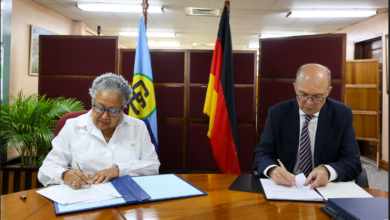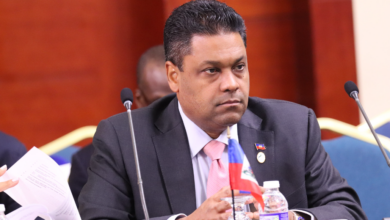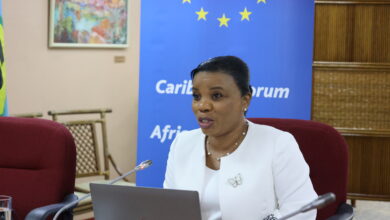Welcome you all to this meeting of the Community Council and in so doing extend a special welcome to our chairman Senator the Honourable Camillo Gonsalves who is attending his first meeting and is immediately thrust into the leadership role. Minister in congratulating you on your assumption of the chair, I do so in the full knowledge that this Council is in very capable hands.
Mr Chairman, you have come to this Council at a time when we are working assiduously towards the finalisation and approval of our first ever Community Strategic Plan, a key element of the Reform Process now underway in our Community. As we do so, this Council is being called upon to perform the fundamental role that the framers of the Revised Treaty intended for it. Article 13 of the Revised Treaty states: “The Community Council shall, in accordance with the policy directions established by the Conference, have primary responsibility for the development of Community strategic planning and co-ordination in the areas of economic integration, functional co-operation and external relations.”
That Treaty obligation therefore places this exercise of designing the Strategic Plan as one for which this Council has a critical responsibility. An Executive Summary of the Draft Plan’s Strategic Framework is being tabled for your consideration. It is a work in progress. Armed with your comments, the Draft Plan will be further refined and submitted to Member States for review and thereafter, through you, to the Conference of Heads of Government.
This Council must advise the Heads of Government on the way forward, recalling their decision that the Plan should target a narrow range of specified outcomes, within specified timeframes, focusing on a few practical and achievable goals. The opportunity is before you to recommend the priorities which the Caribbean Community should focus on over the next five years. I therefore suggest, Mr Chairman that prior to the delivery of the final draft of the Plan to the Heads of Government, this Council devotes a special session to this Strategic Plan. Such a session would also provide an opportunity for you, within the context of the Plan, to do some introspection on your role in the governance structure of the Community, including the preparation for meetings of the Conference.
The document before you today benefits from national consultations, the input of the Change Drivers, the youth, the private and public sectors and civil society, co-ordinated by the Secretariat and the Change Facilitation team. That process was a major focus of attention in the Community as well as within the Secretariat in 2013, as we sought to fulfil the mandate of Heads of Government which, as you will recall, has two main planks – the Strategic Plan and a transformed Secretariat with strategic focus, implementation capacity and strengthened corporate functions, guided by the Plan.
In December 2013, the Change Facilitation Team completed the consultations to inform the Plan in all our Member States and in two Associate Members. I joined the Change Facilitation Team in some of these consultations which sought the views of the widest possible range of stakeholders, including within the Secretariat. Additionally, to expand the reach of the consultations, a telesurvey was undertaken in all Member States and Associate Members and an on-line youth survey was conducted, the latter coordinated by the CARICOM Youth Ambassador Corps. These consultations could not have been possible without the leadership and invaluable support of the Change Drivers in Member States.
Mr. Chairman, Ministers permit me to refer briefly to the other plank of the Reform Process – the restructuring of the Secretariat. Though the restructuring will be significantly influenced by the Strategic Plan, we have already initiated some reforms to improve our efficiency and delivery of service. We are instituting changes for example in the corporate areas, in Human Resource Management, in Finance and in the way we manage projects. We have redesigned our Work Programme to provide for a more outcome oriented focus, guided by goal management. There is still some way to go but change is underway.
We are, however, being compromised by a number of challenges, in particular in relation to an aging information technology infrastructure, staff retention and increasing inflexibility in the use of donor resources.
To keep pace in today’s dynamic environment, a service oriented organisation such as ours cannot provide optimum service without reliable information technology infrastructure. To put it bluntly, the Secretariat’s IT system is almost obsolete and despite our best efforts we have been unable to obtain grant resources to upgrade it. We must therefore rely on the Secretariat’s core budget over the coming years and on our creativity to improve it.
Over the past two years, 38 members of staff, the vast majority at the professional level, have voluntarily demitted office and we have been unable to fill the majority of these posts. This is a reflection of the fact that we are not competitive enough in the labour market which also makes it increasingly difficult for us to attract the best talent.
Stricter implementation of the terms and conditions of use of their resources by International Development Partners is also having an effect on the operations of the Secretariat and the implementation of the work programme.
Taken all together these factors along with the challenging economic and fiscal situation faced by our Member States, affect the ability of the Secretariat to maintain and improve on our service to the Community and the implementation of the work programme. In the face of ever increasing mandates, the need for prioritisation, which lies at the heart of the decision by Heads of Government to devise a Strategic Plan, becomes paramount in order to ensure the focused and optimal use of our human and financial resources.
Mr Chairman, Honourable Ministers, the emphasis on change and reform is absolutely necessary if the thrust of this integration movement is to continue making an impact on the lives of the people. Let it be the guiding light of the fruitful and productive discussions around this table today.
I thank you





